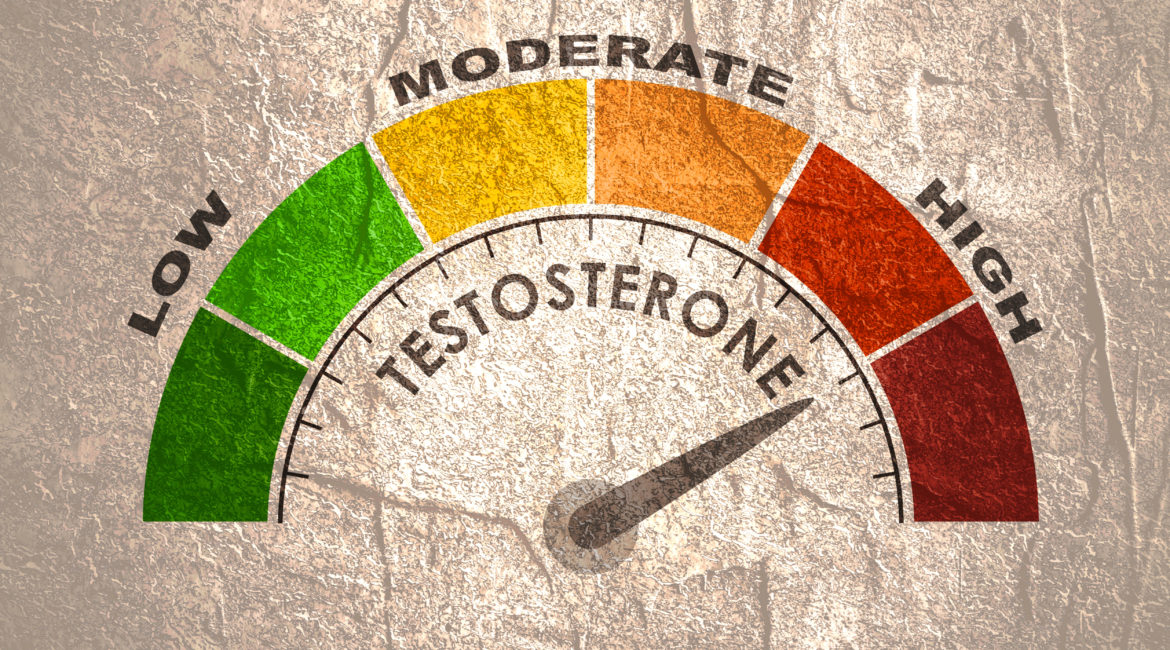The effects of aging can wreak havoc on a man’s mind and body. Mental acuity diminishes, forgetfulness runs rampant, joints begin to ache, and it becomes far easier to put on fat while being harder to gain muscle. Many men also begin to find their libido diminishing or even that they are beginning to have issues with erectile dysfunction. Many of these symptoms can lead to depression or a loss of the sense of self-worth for some men, stealing away the lust for life that they may have had in their youth.
Much of this can be tied to a man’s reduction in testosterone as he ages, which is well documented. The Massachusetts Male Aging Study, a community-based study of 3339 random men aged 40-79 reported an annual decline in total and free testosterone of 0.8-1.6% and 1.7-2.8% per year, respectively.
Another study conducted across the sea, the European Male Aging Study, took roughly the same number of men from eight European countries and reported an age-adjusted annual decline in total testosterone of 0.4% per year. Yet another study, the Hypogonadism In Men Study, reported a prevalence of hypogonadism (gonads that are not producing the required levels of testosterone) of 38.7% of the 2162 men studied. Finally, The Boston Area Community Health Survey estimated a prevalence of symptomatic androgen deficiency in 5.6% of the men they studied, with another study finding that only 12% of those who have the issue seek treatment.
Thankfully, modern medicine has provided a way to help counteract the detrimental health and mental effects that can be caused by aging, or other environmental factors that cause a man’s body to begin producing less testosterone. As the last study linked above indicates, however, it seems that only roughly 12% of the population who needs these treatments are actually seeking them, which is a shame.
For those who have or are considering seeking treatment, there are potential side effects that you should be aware of. Although many potential side effects that are believed to be linked to Testosterone Replacement Therapy (TRT) do not have sufficient evidence found through rigorous study to link them to TRT, we will go through the potential risks below and list their subsequent studies so that you may weigh their significance for yourself.
Summary
While there are some potential risks associated with Testosterone Replacement Therapy, few studies have been conducted to assess the potential long-term adverse effects. The potential risks that are considered are elevated risks of cardiovascular disease (CVD), elevated prostate-specific antigen (PSA) and prostate cancer, lower urinary tract symptoms (LUTS), obstructive sleep apnea (OSA), decreased sperm count in young males and increased red blood cell production.
Potential Risks of Testosterone Replacement Therapy (TRT)
Let’s discuss a few potential risks associated with TRT.
Cardiovascular Disease (CVD)
Reduced serum T levels themselves have been associated with an increased risk of developing CVD, including ischemic heart disease and stroke. A study that attempted to discover whether the reduced testosterone levels in males actually contributed to these types of heart disease was not able to clarify whether or not it was a contributor. The link between low testosterone levels and heart disease would lead one to believe that Testosterone Replacement Therapy may be beneficial in terms of heart health, but no direct evidence exists to support this claim.
To date, the studies on whether Testosterone Replacement Therapy may cause heart disease or other cardiovascular issues themselves are conflicting. One meta-analysis found no differences in cardiac events between a group receiving Testosterone Replacement Therapy and a placebo group, while another recent meta-analysis seems to indicate that there may be a risk.
Looking through all of the available data and literature, it seems that Testosterone Replacement Therapy may indeed cause a heightened risk of cardiovascular events for men with significant comorbidities. As with any health decision, be sure to consult a medical professional before any type of treatment to ensure that it is right for you.
Elevated Prostate-Specific Antigen (PSA)
One side effect that occurs in some men who receive Testosterone Replacement Therapy is an increase in serum PSA and enlarged prostates. Out of 200 men who took part in a European trial to study the effects of TRT on serum PSA levels, seven men throughout the study were shown to have levels above the average. These men were treated for suspected prostatitis, yet no cases of prostate cancer were reported among them.
Risk of Prostate Cancer
Because of the risk of a slightly increased prostate or minimally elevated PSA levels associated with Testosterone Replacement Therapy, there has long been a debate on whether TRT causes an elevated risk of prostate cancer. The studies conducted and data collected so far do not seem to indicate that there is a linkage, with one study actually finding that men who developed prostate cancer while undergoing Testosterone Replacement Therapy had better outcomes than those who had not.
Because of the increased prostate risk, a meta-analysis looking for adverse events associated with Testosterone Replacement Therapy in older men found that those receiving TRT were 11 times more likely to have a prostate biopsy than the placebo group, but there was no difference in men actually diagnosed with prostate cancer.
Another study reviewed data on 150,000 men over a 15-year period to compare prostate cancer outcomes for men who had received Testosterone Replacement Therapy prior to a prostate cancer diagnosis versus those who had not. This study found no statistical difference in disease-specific survival, overall survival, or a need to undergo salvage androgen deprivation therapy.
They did find, however, that men who had undergone TRT prior to diagnosis were more likely to have moderately differentiated prostate cancer than to have poorly differentiated prostate cancer. They were also more likely to be diagnosed with Stage 3 than Stage 4 cancer.
Lower Urinary Tract Symptoms (LUTS)
Similar to prostate cancer, it has long been suspected that Testosterone Replacement Therapy results in increased prostate volume and would therefore worsen symptoms due to benign prostate hyperplasia (BPH). Like the theories that TRT would cause prostate cancer, however, the data seems to indicate that it may in fact improve outcomes in some people who are prone to LUTS.
A 2014 study investigated the effects of Testosterone Replacement Therapy on LUTS in men with testosterone deficiency, treating 259 men with TRT for a median of 42.3 months to find if there were any significant effects. The men in this study had a mean decrease in their International Prostate Symptom (IPSS) score of 63.5%, had significant improvements in bladder wall thickness and postvoidal residual volumes as well as an increase in their prostate volume. This study provided more of the mounting evidence that TRT may in fact improve LUTS, rather than worsen or cause it as many have believed.
Obstructive Sleep Apnea (OSA)
There have been five studies looking into the effects of Testosterone Replacement Therapy on sleep, but only one focused specifically on TRT and its effects on Obstructive Sleep Apnea (OSA).
An 18-week randomized, double-blind, placebo-controlled trial of 67 men found that Testosterone Replacement Therapy in obese men with severe Obstructive Sleep Apnea mildly worsened, regardless of their initial testosterone levels in the first seven weeks. They also found, however, that the worsening resolved after 18 weeks of continued TRT. The group taking Testosterone Replacement Therapy had a worsened Oxygen Desaturation Index (ODI) as well as nocturnal hypoxemia at seven weeks.
The same study authors, using the same group, also sought to evaluate the body composition and cardiovascular effects of Testosterone Replacement Therapy in men with obesity and severe OSA. They found that 18 weeks of TRT improved important cardiovascular and metabolic parameters including insulin resistance, decreased liver fat, and increased lean muscle mass, but did not differentially reduce their overall weight or the underlying metabolic syndrome.
To date, there are no randomized trials focusing on the long-term effects of TRT on OSA, but most places where you find risks listed for TRT will list Obstructive Sleep Apnea as a potential side effect.
Erythrocytosis (Increased Red Blood Cell Count)
Erythrocytosis, or polycythemia, is a well-known side effect of Testosterone Replacement Therapy that has been documented in multiple studies, although the cause is poorly understood and rarely causes any serious detrimental health effects.
Since 2008 there has only been one study that addressed elevated hemoglobin and hematocrit in patients undergoing Testosterone Replacement Therapy, but the author’s theories for why this side effect occurs were disproven. There were no serious adverse health events encountered during the study of 36 months, and although TRT is known to increase these levels, it is not known to cause serious harm.
To date, there have been no other long-term studies to adequately evaluate the potential risks of erythrocytosis from TRT. Clinicians are advised to check their patient’s hematocrit within the first three to six months of beginning Testosterone Replacement Therapy and annually after that baseline is established. If they find the patient’s hematocrit rises above 54%, it is advised that TRT be stopped until the patient’s hematocrit decreases to a safe level. The patient should be evaluated for hypoxia, underlying lung disease, and sleep apnea. If none are found, the patient can resume TRT at a lower dose.
How to Avoid Side Effects
While many of these side effects seem scary and are mentioned in nearly every article you read about the risks of testosterone Replacement Therapy, if you read the actual studies you find that most of them found that TRT may actually help those who have the underlying conditions already when they begin the therapy.
If you are concerned about the potential side effects of Testosterone Replacement Therapy, that should give you all the more reason to ensure that you go through an assessment with a medical professional. They will take baseline readings and go through your health record to know before prescribing treatment if you would be a good candidate for the therapy or not. They should monitor your levels periodically throughout the treatment, in order to check that there aren’t any potential negative health issues developing as a result.
If you are concerned about prostate issues, there are many different supplements like these available that can help reduce enlargement which may be a good idea to take for any male over 40 years old, whether you are taking Testosterone Replacement Therapy or not.
For sleep apnea and cardiovascular concerns, it is always a good idea to do some form of cardiovascular exercise five or six days a week to keep yourself in shape. This will not only help prevent some of the potential side effects that some may find with Testosterone Replacement Therapy but will help with a large range of issues that men should be concerned with when they start to get a little older.
The tips to avoid the potential side effects of Testosterone Replacement Therapy are essentially the same health tips that any man should follow as they get older: consult a health professional regularly, eat as healthy as you can, exercise, and ensure that you are getting all of the essential vitamins and nutrients that your body needs.
Benefits of Testosterone Replacement Therapy
The effects of hypogonadism and the resulting testosterone deficiency can make men begin to feel like less of a man. Low testosterone levels can lead to depression, a lowered sexual appetite, erectile dysfunction, a decrease in lean muscle mass but addition of excess fat, hair loss, fatigue, lower energy levels, irritability, and memory loss.
While there are potential side effects to consider that may occur through Testosterone Replacement Therapy, many men suffering from the symptoms of Low T would gladly trade the low risk of those side effects if they could regain their lust for life and feelings of what it means to be a man.
Testosterone Replacement Therapy can help with many of the Low T symptoms if not reverse them entirely. As the study linked above found, after 18 weeks of TRT men begin to find themselves with better cardiovascular health, their lean muscle mass improves while fat deposits are reduced around their body. If they have been suffering from a loss of libido, that is one of the greatest results for many who undergo the therapy, especially if they are happily married and feel that has been a place where they were no longer performing as they should.
Nothing is guaranteed, but millions of men who have undergone Testosterone Replacement Therapy have felt like it gave them their lives back, putting them back on the trajectory that they felt their life had been on before the Low T symptoms began to slow them down and take part of their life force away.
Conclusion
No matter what their lifestyle, profession, home life, or interests are, most men simply want to be able to feel like men. The symptoms of low testosterone can be crushing to a man’s psyche because that is the very thing those symptoms seem to take away, and they suffer in silence even though treatment is readily available to solve many of those issues.
As one of the studies linked above found, only about 12% of men who suffer from the symptoms of low testosterone seek treatment, which is a shame. There are many clinics available now that can provide an assessment of your levels to see if you are a candidate for Testosterone Replacement Therapy, and if you are, the therapy can be life-changing.
If you have been suffering from any of the symptoms of low testosterone listed above, our team at Prolong Labs can help you find the right anti-aging clinic at no cost to you. You may find that it’s one of the best decisions you ever make, as it can revitalize your life and give you back the passion and excitement that you may have thought was gone forever.
Low testosterone is nothing to be ashamed of, but many men hesitate to even get themselves checked out for fear that it will be some sort of a tacit admission that something is wrong with them, or that they are somehow less of a man for undergoing this type of therapy.
Many millions of men have decided not to let that stop them, and have found that taking the leap and undergoing Testosterone Replacement Therapy made them feel as if they were truly alive again. If you are experiencing any of the symptoms of low testosterone, there is no reason to hesitate any longer. Our team at Prolong Labs will help you find an anti-aging clinic that can help you get back on track to enjoy life just as you did when you were young.




